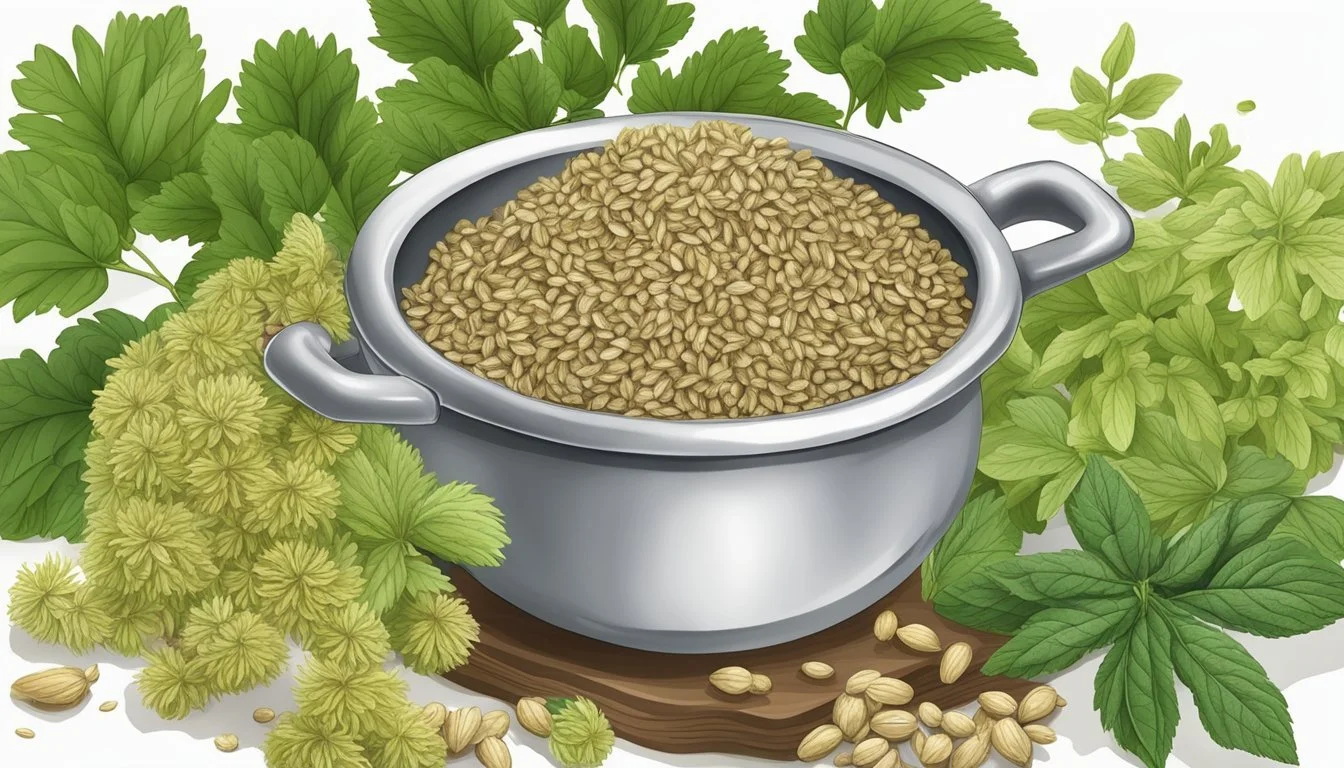Angelica Seeds Substitutes
Best Alternatives for Cooking and Herbal Use
When your recipe calls for Angelica seeds, finding the right substitute is essential to maintaining the intended flavor and aroma of your dish. Angelica seeds bring an earthy, slightly sweet herbal note that can be tricky to replicate exactly.
Celery seeds are one of the best alternatives, offering a similar aromatic profile with a slightly bitter edge. They pair well with a variety of herbs like parsley, thyme, and oregano, enhancing the overall complexity of your dish.
Dill seeds provide another excellent option, easily available and versatile in cooking. With a mild anise flavor, dill seeds can seamlessly replace Angelica seeds, particularly in savory dishes, without overwhelming other ingredients.
Understanding Angelica
Angelica is an aromatic plant known for its earthy and slightly sweet flavor. It's used in a variety of contexts, from herbal liqueurs to culinary delights, and boasts notable health benefits.
History and Uses
Angelica has a rich history, originally growing in the cold climates of Northern Europe and Asia. Historically, it was revered in ancient medicinal practices for its healing properties.
The plant's leaves, seeds, and roots are incorporated in various culinary applications. Angelica is particularly prominent in the production of herbal liqueurs and digestifs, valued for its distinct flavor.
Culinary Uses:
Herbal liqueurs like Chartreuse
Flavoring for fish and poultry dishes
Preserves and candies
Its versatility in both sweet and savory dishes underscores its esteemed place in traditional and modern cooking.
Flavor Characteristics
Angelica presents an earthy and slightly sweet profile. Its leaves and stems carry a herbal tone, while the seeds and roots have a stronger, more intense flavor.
The seeds, in particular, offer a unique combination of savory and sweet notes, making them suitable for various recipes. This flavor complexity is why Angelica is crucial in herbal liqueurs.
These characteristics make Angelica a favored ingredient not only for flavoring spirits but also for enhancing the taste of different culinary creations, delivering a subtle yet impactful taste.
Health Benefits
Angelica is noted for offering several health benefits. It contains vitamins, minerals, and antioxidant properties that are beneficial for the immune system.
Traditionally, it has been used to treat digestive issues, like indigestion and gas. Modern studies also suggest that it may support overall wellness by providing anti-inflammatory effects.
Benefits Include:
Supporting digestive health
Boosting the immune system
Providing essential nutrients
Angelica’s combination of nutritional and therapeutic properties further justifies its historical use in herbal medicine, making it a valuable addition to a health-conscious diet.
Common Angelica Seed Substitutes
When looking for substitutes for angelica seeds, there are several options that can provide similar flavors and aromas. Here are some suitable alternatives, each with its own unique properties.
Fennel Seeds
Fennel seeds offer a sweet, anise-like flavor. These seeds are commonly used in Mediterranean and Middle Eastern cuisine. Their slight licorice undertone makes them suitable for both savory and sweet dishes. Fennel seeds are also known for their digestive benefits. Use them in soups, baked goods, or as a rub for meats to impart a sweet, aromatic flavor. When substituting for angelica seeds, use a 1:1 ratio for similar flavor intensity.
Caraway Seeds
Caraway seeds have a complex flavor profile with hints of anise, citrus, and a mild peppery note. Often found in European and Middle Eastern cuisines, they are a great substitute for angelica seeds. Caraway seeds are frequently used in bread, especially rye, as well as in sauerkraut and pickles. They also offer digestive health benefits. Because of their distinctive taste, caraway seeds can replace angelica seeds in a 1:1 ratio in recipes.
Dill Seed
Dill seeds provide a slightly sweet flavor similar to caraway but with an added grassy, herbal note. These seeds are widely used in Scandinavian and Eastern European cooking, often in pickling, soups, and salads. Dill seeds add a unique flavor that can enhance various dishes. When substituting for angelica seeds, it’s typically best to use an equal amount, making adjustments as needed based on personal taste preferences.
Celery Seeds
Celery seeds are an aromatic spice with an earthy, slightly bitter flavor. They come from the celery plant and are a versatile substitute for angelica seeds. Commonly used in American and South Asian recipes, celery seeds can enhance soups, stews, and roasted vegetables. Besides their flavor, they offer potential health benefits, such as anti-inflammatory properties. When using celery seeds as a substitute for angelica seeds, a 1:1 ratio is generally effective.
Substitutes for Specific Dishes
When it comes to replacing Angelica seeds in various dishes, choosing the right substitute depends heavily on the type of dish being prepared. Strategic substitutions can help maintain the desired flavor and aroma.
Baking and Pastries
In baking and pastries, Angelica seeds often contribute a subtle, sweet note. Substitutes like fennel seeds or caraway seeds can be particularly effective. Fennel seeds bring a sweet, slightly licorice flavor that complements baked goods well.
Caraway seeds offer a nutty, slightly peppery taste that blends smoothly in bread and pastry recipes.
For those looking for a more citrusy flavor, lemon zest can also be used. Use about half a teaspoon of zest for every teaspoon of Angelica seeds needed. These substitutions ensure that the flavors remain balanced and the final product retains its intended taste profile.
Soups and Stews
In soups and stews, Angelica seeds provide a robust herbal quality. Celery seed is a strong candidate for substitution due to its earthy and slightly bitter flavor that mimics Angelica well.
Lovage is another excellent substitute, providing a mild, celery-like flavor.
Another herb that pairs well in these dishes is dill seed. Dill seeds offer an anise-like flavor that can enhance the soup or stew. These alternatives ensure that the integrity of hearty dishes remains unchanged while keeping the flavor complex and aromatic.
Salads and Vegetables
For salads and vegetable dishes, Angelica seeds add a distinctive herbal note. Basil is a versatile substitute that provides a sweet, aromatic profile. Use fresh basil leaves to mix into salads or garnish vegetable dishes.
Parsley is another useful replacement, offering a bright, slightly peppery taste that complements fresh greens and cooked vegetables alike.
Celery seed can also be a good choice here, adding a bit of crunch and an earthy flavor. These options help maintain the freshness and flavor complexity in salads and vegetable dishes.
Tea Blends and Herbal Applications
In tea blends and herbal applications, Angelica seeds contribute to the overall aromatic profile. Cardamom seeds can replace Angelica seeds with their complex flavor that includes sweet, spicy, and earthy notes.
Dill seeds can also be incorporated, particularly in brewing, for a slightly anise-like taste. Fennel seeds, with their sweet and licorice-like flavor, are another substitute that blends well in herbal teas.
These substitutions ensure that the tea retains its aromatic strength and desired flavor profile, making them excellent choices for various herbal applications.
Alternative Substitutes by Flavor Component
When seeking alternatives for angelica seeds, it's essential to focus on matching the specific flavor components that angelica seeds would contribute to your dish. Below, we’ll explore substitutes categorized by their primary flavor profiles: sweet, earthy, bitter, and aromatic.
Sweet Substitutes
Angelica seeds often provide a mild sweetness. For a substitute that mimics this sweetness, consider lemon zest. Its bright and citrusy flavor can add a sweet dimension without overpowering other ingredients.
Tarragon can also be used, contributing a subtle sweetness and slight licorice note. This is suitable for both savory and sweet dishes, providing a balanced flavor. Another option is dried fennel seeds, which offer a mild sweetness and a hint of anise that blends well with various recipes.
Earthy Substitutes
For the earthy undertones found in angelica seeds, consider juniper berries. They bring a robust, pine-like earthiness to your dish. Use them sparingly as their flavor is potent and can dominate.
Celery seed is another excellent choice, providing a gentle earthy flavor that complements a wide range of dishes. Coriander seeds can also be used due to their slight citrus and earth blend. These seeds work particularly well in soups and stews, echoing the complexity of angelica seeds.
Bitter Substitutes
When a touch of bitterness is needed, dill seeds serve well. They carry a mild bitterness with a slight tang, perfect for pickling and savory applications. Another option is orange peel (dried and crushed), which offers a mild bitter note along with a citrusy twist.
Fenugreek seeds can also replace the bitterness of angelica seeds. These seeds are slightly more intense, so use them sparingly to avoid overpowering the dish. They blend particularly well in curries and spice blends.
Aromatic Substitutes
Aromatic substitutes bring the necessary fragrance and flavor complexity. Cardamom seeds provide a multidimensional aroma with earthy and slightly sweet undertones, excellent for both desserts and savory dishes.
Anise seeds offer a strong, sweet aroma with a hint of licorice, perfect for baking and confectionery. Tarragon stands out as well for its mellow, sweet, and herbal fragrance that can enhance a variety of culinary creations without being overpowering.
Choosing the right substitute based on these flavor components can help maintain the desired taste balance in your culinary creations.
Substitutes for Angelica in Dietary Use
There are several effective substitutes for Angelica in dietary applications, each bringing unique flavors and benefits. Key substitutes include lovage, celery-based options, and other herbal alternatives. Each offers different qualities and uses in cooking.
Using Lovage
Lovage is a common substitute for Angelica. This herb has a mild, celery-like flavor and a slightly spicy quality. It can be used in various dishes and is particularly ideal for soups, stews, and stocks.
Lovage leaves or seeds can be used, depending on the recipe. Lovage’s versatility also makes it suitable for flavoring cordials and spirits. When substituting, it is recommended to use a 2:1 ratio of lovage to Angelica to achieve a similar taste profile.
Celery-Based Substitutes
Celery leaves and celery root are excellent substitutes for Angelica. Celery leaves have a robust, earthy flavor that complements numerous dishes. They are particularly useful in salads, soups, and as garnishes.
Celery root, also known as celeriac, offers a slightly nutty taste which can add depth to a dish. Incorporating celery root can also boost dietary fiber intake. Celery seeds are another option, with a strong, concentrated flavor suitable for pickling and seasoning various dishes.
Alternative Herbal Substitutes
Other herbs such as basil, dill, and parsley can serve as substitutes for Angelica, depending on the recipe. Basil provides an aromatic, sweet herbal quality that works well in sauces and dressings.
Dill, particularly its seeds, can replace Angelica in recipes requiring a mild, slightly bitter taste. Parsley offers a fresh, bright flavor suitable for numerous culinary applications. These herbs not only mimic Angelica's flavor but also contribute additional nutrients and antioxidants to the dish.
Using these substitutes can help maintain the desired taste and nutritional benefits while offering a varied and rich culinary experience.
Considerations When Selecting Substitutes
When choosing substitutes for Angelica seeds, it is critical to consider factors such as taste, texture, and nutritional content. Each of these aspects can significantly impact the final outcome of your dish.
Taste Adjustments
Different substitutes offer unique flavor profiles that may alter the taste of your recipe. For example, lemon zest provides a bright citrus note, making it a good substitute for 1/2 teaspoon of angelica. Basil, on the other hand, offers a slightly sweet herbal quality. If the recipe calls for an equal amount of angelica, basil might be a fitting replacement, especially in savory dishes.
When substituting with celery seeds, expect an earthy and somewhat bitter flavor. Dill seeds provide an earthy and anise-like note, making them suitable for pickling or brewing applications. Each of these substitutes should be used in moderation to avoid overpowering the dish.
Textural Considerations
The texture of the substitute is another important factor. Angelica seeds are often used for their crunch. Lovage, with its mild, celery-like flavor, offers a similar crunch, making it an ideal replacement. Similarly, celery seeds and dill seeds can provide the necessary texture, especially when used in cooked or pickled dishes.
Consider the form of the substitute as well. Seeds may offer a different mouthfeel compared to leaves or zest. For example, using basil leaves instead of seeds can significantly change the texture. It is essential to match the substitute's form and texture to the intended use in the dish for best results.
Nutritional Content
While the primary focus is often on flavor and texture, the nutritional content of substitutes should not be overlooked. For example, celery seeds are known for their anti-inflammatory and antioxidant properties, which could offer added health benefits. Lovage is also rich in antioxidants that help combat free radicals.
When selecting substitutes, consider additional health benefits they might provide. Cardamom seeds, for instance, contain compounds that support digestive health and may provide a slight sweet, earthy flavor, enhancing both the taste and nutritional profile of your dish.
Making informed decisions about substitutes ensures that your dishes maintain their desired quality, whether in taste, texture, or nutrition.
Final Thoughts on Choosing Angelica Substitutes
Selecting the right substitute for angelica requires understanding the specific needs of your dish. Angelica root and angelica seed often bring unique earthy and slightly sweet flavors, making direct replacements tricky.
For cooking, options like basil and caraway seeds bring aromatic qualities. Basil offers a fresh, slightly sweet herbal note, while caraway adds a crunchy texture with an earthy taste.
In slow-cooked recipes and casseroles, lovage and dill seed provide good alternatives. Lovage's mild, celery-like flavor pairs well with simmering dishes, ensuring the herbal tones are retained without overpowering. Dill seed, with its earthy and anise-like notes, can be particularly effective.
Recommended Substitutes
Substitute Flavor Profile Best Used In Basil Aromatic, slightly sweet Cooking, salads, light dishes Caraway Seeds Earthy, crunchy texture Breads, stews, slow-cooked recipes Lovage Mild, celery-like Casseroles, soups, stews Dill Seed Earthy, anise-like Pickling, brewing, slow-cooked recipes
Each substitute has distinct characteristics. Celery seed can also be used and blends well with herbs like parsley, thyme, and oregano to achieve a balanced flavor. Remember to adjust quantities to match the intensity of angelica.
When replacing angelica root in particular, cardamom seeds can be a choice for their complex, aromatic flavor, though they are more intense. Each substitute can be adapted to match the original ingredient's role in your recipe.









